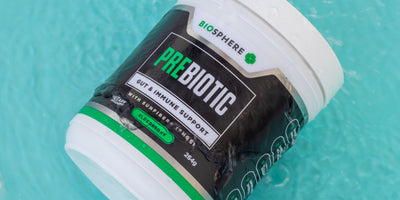
How Prebiotics Can Help Alleviate Symptoms of IBS
Irritable Bowel Syndrome (IBS) is a widespread gastrointestinal disorder that affects a significant portion of the population globally. Characterised by chronic abdominal pain, bloating, and altered bowel habits such as diarrhea or constipation, IBS can drastically impact an individual's quality of life. While the precise causes of IBS are not fully understood, recent research points towards gut health, particularly the balance of gut microbiota, as a crucial factor in managing its symptoms. One promising strategy to improve gut health is through the consumption of prebiotics. This article delves into how prebiotics can help alleviate the symptoms of IBS and enhance overall digestive health.
Understanding IBS and Its Symptoms
IBS is a complex, multifaceted disorder that affects the large intestine. The symptoms of IBS vary widely among individuals and can include a combination of abdominal pain, cramping, bloating, gas, diarrhea, constipation, or alternating bouts of both. These symptoms can be persistent or intermittent and often cause significant discomfort and distress, reducing quality of life and increased healthcare utilisation.
The exact cause of IBS remains elusive, but it is believed to involve a combination of genetic, environmental, and psychological factors. Stress, diet, and infections are common triggers that can exacerbate symptoms. Furthermore, abnormalities in gut-brain communication, motility issues, and hypersensitivity of the intestines contribute to the condition's complexity. Given the broad range of symptoms and triggers, managing IBS often requires a comprehensive, individualised approach.
Standard treatment options for IBS include dietary modifications, stress management techniques, medications to manage specific symptoms, and, increasingly, interventions aimed at improving gut health. Among these, prebiotics have emerged as a promising avenue for relief. Individuals can better manage their symptoms and improve their overall well-being by understanding and addressing the underlying factors contributing to IBS, particularly those related to gut health.
What Are Prebiotics?
Prebiotics are non-digestible components of food that beneficially affect the host by selectively stimulating the growth and/or activity of one or a limited number of beneficial bacteria in the colon. Unlike probiotics, which are live bacteria introduced into the gut, prebiotics serve as food for the existing beneficial bacteria, helping them to thrive and maintain a healthy gut environment. This, in turn, can lead to improved digestive health and reduced symptoms of gastrointestinal disorders such as IBS.
Common types of prebiotics include inulin, fructooligosaccharides (FOS), galactooligosaccharides (GOS), and resistant starch. These substances are naturally found in a variety of foods. Inulin and FOS, for example, are found in chicory root, onions, garlic, and bananas. GOS is present in dairy products and certain legumes, while resistant starch is found in green bananas, oats, and cooked and cooled potatoes. These prebiotics are also available as dietary supplements, making incorporating them into the diet easier.
Consuming prebiotics can lead to several health benefits. By selectively feeding beneficial gut bacteria, prebiotics help increase the population of these bacteria, enhancing the overall balance of the gut microbiota. This process can produce short-chain fatty acids (SCFAs), such as butyrate, acetate, and propionate, which have anti-inflammatory properties and play a vital role in maintaining the health of the colon lining. These benefits make prebiotics an attractive option for managing IBS symptoms and promoting overall gut health.
The Role of Gut Microbiota in IBS
The gut microbiota, a complex community of trillions of microorganisms residing in the digestive tract, plays a critical role in maintaining digestive health, immune function, and overall well-being. An imbalance in the gut microbiota, known as dysbiosis, has been implicated in the pathogenesis of IBS. Dysbiosis is characterised by a reduction in the diversity and abundance of beneficial bacteria and an overgrowth of potentially harmful bacteria, which can disrupt normal gut function and contribute to the symptoms of IBS.
Studies have shown alterations in the composition and activity of the gut microbiota in individuals with IBS. These alterations can affect gut permeability, leading to a "leaky gut" where harmful substances pass through the gut lining into the bloodstream, triggering inflammation and immune responses. Furthermore, an imbalanced microbiota can produce excessive gas and toxins during the fermentation of undigested food, causing bloating, pain, and discomfort. This dysbiosis also affects gut motility, resulting in diarrhea or constipation, hallmark symptoms of IBS.
Addressing dysbiosis through dietary interventions, such as the consumption of prebiotics, can help restore a healthy balance of gut microbiota. Prebiotics can enhance gut barrier function, reduce inflammation, and regulate bowel movements by promoting the growth of beneficial bacteria. These effects can alleviate many of the uncomfortable symptoms associated with IBS, providing a natural and sustainable approach to managing the condition. Understanding the role of gut microbiota in IBS underscores the importance of maintaining a healthy gut environment for overall digestive health.
How Prebiotics Influence Gut Health

Prebiotics benefit gut health primarily by serving as a food source for beneficial gut bacteria. When consumed, prebiotics pass through the upper part of the gastrointestinal tract undigested and reach the colon, where the gut microbiota ferments them. This fermentation process produces short-chain fatty acids (SCFAs) such as butyrate, acetate, and propionate, essential in maintaining gut health.
SCFAs contribute to gut health in several ways. Butyrate, for example, is a primary energy source for colonocytes (cells lining the colon) and helps maintain the integrity of the gut barrier. By strengthening the gut lining, butyrate prevents harmful substances from passing through the gut wall into the bloodstream, reducing inflammation and supporting immune function. Additionally, SCFAs have been shown to modulate gut motility, which can help alleviate symptoms of diarrhea and constipation commonly experienced by individuals with IBS.
Furthermore, prebiotics help increase the population of beneficial bacteria in the gut, such as Bifidobacteria and Lactobacilli. These bacteria play a vital role in maintaining a balanced and healthy gut microbiota, outcompeting harmful bacteria, and producing substances that inhibit the growth of pathogens. By enhancing the growth of these beneficial bacteria, prebiotics can improve overall gut health, reduce symptoms of dysbiosis, and support the immune system. This positive modulation of the gut microbiota makes prebiotics a valuable tool in managing IBS symptoms and promoting digestive health.
Scientific Evidence Supporting Prebiotics for IBS
A growing body of scientific evidence supports the use of prebiotics for alleviating symptoms of IBS. Several studies and clinical trials have investigated the effects of prebiotics on IBS symptoms, yielding promising results. These studies provide a strong foundation for using prebiotics as a therapeutic strategy for managing IBS and improving gut health.
One study published in the American Journal of Gastroenterology examined the effects of a prebiotic supplement on individuals with IBS. Participants who consumed the prebiotic supplement experienced significant reductions in abdominal pain and bloating compared to those who took a placebo. The study concluded that prebiotics could effectively alleviate some of the most common and distressing symptoms of IBS.
Research published in the journal Gut investigated the impact of prebiotic supplementation on the gut microbiota of individuals with IBS. The study found that prebiotic supplementation led to an increase in beneficial gut bacteria, such as Bifidobacteria, and a decrease in harmful bacteria. This shift in the gut microbiota composition was associated with improved overall gut health and a reduction in IBS symptoms, highlighting the potential of prebiotics to restore a healthy balance in the gut microbiota.
A comprehensive review published in the journal Nutrients explored the effects of various prebiotics on IBS symptoms. The review highlighted that prebiotics, particularly inulin and FOS, have improved stool consistency and frequency, reduced abdominal discomfort, and enhanced overall quality of life for individuals with IBS. These findings underscore the therapeutic potential of prebiotics in managing IBS and provide a rationale for incorporating them into dietary interventions for individuals with this condition.
Types of Prebiotics Beneficial for IBS
Several types of prebiotics have been studied for their potential benefits in managing IBS symptoms. Each type of prebiotic offers unique properties and benefits, making it important to understand their specific effects and sources. Incorporating various prebiotic-rich foods into the diet can help achieve a balanced and effective approach to managing IBS.
Inulin is a prebiotic fibre in foods such as chicory root, onions, garlic, and bananas. Inulin has been shown to stimulate the growth of Bifidobacteria in the colon, which can improve bowel regularity and reduce symptoms of constipation. Additionally, inulin fermentation produces SCFAs that support gut health and reduce inflammation, making it a valuable prebiotic for individuals with IBS.
Fructooligosaccharides (FOS) are naturally present in foods like asparagus, leeks, and artichokes. FOS promotes the growth of beneficial bacteria and has been shown to reduce bloating and abdominal pain in individuals with IBS. By enhancing the gut microbiota balance and producing SCFAs, FOS can improve overall gut health and alleviate IBS symptoms.
Galactooligosaccharides (GOS) are found in dairy products and certain legumes. GOS has been associated with improved gut motility, making it particularly beneficial for individuals with IBS who experience constipation. By promoting the growth of beneficial bacteria and reducing gut inflammation, GOS can help alleviate various IBS symptoms and support digestive health.
Resistant starch is present in green bananas, oats, and cooked and cooled potatoes. Resistant starch is fermented in the colon, producing SCFAs that support gut health and reduce inflammation. By enhancing the gut microbiota balance and improving bowel regularity, resistant starch can help manage IBS symptoms and promote overall digestive well-being.
Incorporating these prebiotic-rich foods into the diet can help enhance gut health and alleviate IBS symptoms. By understanding the specific benefits and sources of each type of prebiotic, individuals can make informed dietary choices that support their digestive health and manage IBS effectively.
Incorporating Prebiotics into Your Diet
Incorporating prebiotics into your diet can be simple and enjoyable. They offer a natural way to support gut health and alleviate IBS symptoms. Here are some practical tips for adding prebiotic-rich foods to your daily meals, along with examples of prebiotic-rich meals and snacks.
Start Slow: Introduce prebiotic foods gradually to allow your gut to adjust and minimise potential discomfort. Begin with small amounts of prebiotic-rich foods, such as adding a tablespoon of inulin to your morning smoothie or incorporating a small serving of cooked and cooled potatoes into your lunch. Gradually increase your intake as your body becomes accustomed to the additional fibre.
Combine with Probiotics: Pair prebiotic foods with probiotic-rich foods to maximise gut health benefits. Probiotics provide live beneficial bacteria, while prebiotics serve as food for these bacteria, creating a synergistic effect. For example, enjoy a yogurt parfait with bananas and oats for breakfast, or try a salad with chicory root and a side of fermented vegetables like sauerkraut or kimchi.
Diversify Your Sources: Include a variety of prebiotic foods in your diet to ensure a broad range of beneficial effects. Each type of prebiotic offers unique benefits, so incorporating a mix of inulin, FOS, GOS, and resistant starch can help achieve a balanced approach to gut health. Try different recipes and food combinations to keep your meals interesting and nutritious.
Stay Hydrated: Drinking plenty of water helps prebiotics work effectively and supports overall digestive health. Adequate hydration is essential for the fermentation process and helps prevent any potential discomfort associated with increased fibre intake. Aim to drink at least eight glasses of water a day, especially when consuming higher amounts of prebiotic foods.
Examples of probiotic-rich meals include a breakfast smoothie with bananas, oats, and a tablespoon of inulin, a lunchtime salad with chicory root, leeks, and artichokes, or a dinner featuring green bananas, cooked and cooled potatoes, and a side of garlic hummus with vegetables. Snacks can include dairy-based options like yogurt with a sprinkle of GOS or a serving of asparagus with a dip made from prebiotic-rich legumes.
By incorporating these practical tips and prebiotic-rich foods into your diet, you can support your gut health, alleviate IBS symptoms, and enjoy various delicious and nutritious meals.
Potential Side Effects and How to Manage Them
While prebiotics offer numerous benefits for gut health and IBS management, some individuals may experience side effects, particularly when first incorporating them into their diet. Understanding these potential side effects and how to manage them can help ensure a smooth and beneficial transition to a prebiotic-rich diet.
Gas and Bloating: One of the most common side effects of prebiotic consumption is increased gas and bloating. This occurs because prebiotics are fermented by gut bacteria, producing gas as a byproduct. While this is a normal part of the fermentation process, it can cause discomfort for some individuals. To minimise these side effects, start with small amounts of prebiotic foods and gradually increase your intake. This allows your gut microbiota to adjust and reduces the likelihood of excessive gas production.
Abdominal Discomfort: Some individuals may experience abdominal discomfort or cramping when first consuming prebiotics. This can be due to the increased activity of gut bacteria and the production of short-chain fatty acids. To manage this discomfort, it's important to introduce prebiotics slowly and monitor your body's response. If discomfort persists, consider reducing your intake temporarily and reintroducing prebiotics more gradually.
Consult a Healthcare Professional: If you experience severe discomfort or have underlying health conditions, seek medical advice before making significant changes to your diet. A healthcare professional can provide personalised recommendations and help you develop a plan that supports your digestive health while minimising potential side effects.
By being mindful of these potential side effects and taking a gradual approach to incorporating prebiotics into your diet, you can enjoy the benefits of improved gut health and reduced IBS symptoms without unnecessary discomfort.
Prebiotics vs. Probiotics: Which Is Better for IBS?
Both prebiotics and probiotics play important roles in maintaining gut health, but they work in different ways. Understanding the differences between prebiotics and probiotics can help you determine which approach, or combination of approaches, is best for managing IBS symptoms.
Prebiotics: Prebiotics are non-digestible food components that serve as food for beneficial gut bacteria. By stimulating the growth and activity of these bacteria, prebiotics help maintain a healthy balance of gut microbiota. Prebiotics can improve gut barrier function, reduce inflammation, and regulate bowel movements, making them a valuable tool for managing IBS symptoms. Common prebiotic foods include chicory root, garlic, onions, bananas, and certain whole grains.
Probiotics: Probiotics are live beneficial bacteria that are introduced into the gut through dietary supplements or fermented foods. Probiotics can directly contribute to a healthy gut microbiota by increasing the population of beneficial bacteria and inhibiting the growth of harmful bacteria. Probiotics have been shown to improve various digestive conditions, including IBS, by reducing symptoms such as abdominal pain, bloating, and irregular bowel movements. Common probiotic-rich foods include yogurt, kefir, sauerkraut, kimchi, and other fermented products.
For optimal gut health, a combination of prebiotics and probiotics, known as synbiotics, can be most effective. This synergistic approach ensures that beneficial bacteria are both introduced and supported in the gut, enhancing overall digestive health and alleviating IBS symptoms. For example, pairing prebiotic-rich foods like bananas or chicory root with probiotic-rich foods like yogurt or kefir can create a powerful combination that supports healthy gut microbiota.
Incorporating both prebiotics and probiotics into your diet can provide comprehensive support for your digestive health. By understanding the unique benefits of each and how they work together, you can develop a balanced approach to managing IBS symptoms and promoting overall well-being.
Summary
Understanding IBS
- IBS is a chronic gastrointestinal disorder characterised by symptoms like abdominal pain, bloating, diarrhea, and constipation.
- Causes are multifactorial, including genetics, stress, diet, and gut microbiota imbalances.
- Prebiotics are non-digestible food components that promote the growth of beneficial gut bacteria.
- Common types include inulin, FOS, GOS, and resistant starch.
- A healthy gut microbiota is crucial for digestive health.
- Dysbiosis, or an imbalance in gut bacteria, is linked to IBS symptoms like increased gut permeability and inflammation.
- Prebiotics are fermented by gut bacteria, producing SCFAs that support gut health.
- Benefits include enhancing gut barrier function, reducing inflammation, and regulating bowel movements.
- Studies show prebiotics can reduce IBS symptoms like abdominal pain and bloating.
- Prebiotics help increase beneficial bacteria and improve overall gut health.
- Inulin, FOS, GOS, and resistant starch are effective in managing IBS symptoms.
- This prebiotics are found in foods like chicory root, onions, garlic, bananas, and green bananas.
- Introduce prebiotic foods gradually and pair them with probiotics for maximum benefit.
- Include a variety of prebiotic-rich foods and stay hydrated.
- Common side effects include gas, bloating, and abdominal discomfort.
- Start with small amounts and consult a healthcare professional if necessary.
- Prebiotics feed beneficial bacteria, while probiotics introduce live bacteria.
- A combination of both, known as synbiotics, is most effective for gut health.
Prebiotic Information
For everything you need to know about prebiotics and prebiotic supplements, check out our comprehensive information page here.
Prebiotic
Biosphere Nutrition’s Prebiotic Powder is a unique blend of Sunfiber® and Black Elderberry Extract, designed to nurture gut health and support the immune system. This easy-to-mix, great-tasting formula ensures optimal absorption and digestive comfort. To learn more about our Prebiotic, check out the product page here.







